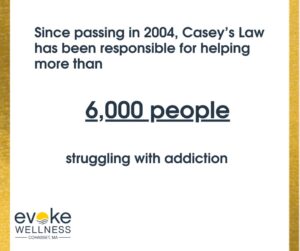You or your loved one may be suffering from addiction and feel there is no way out. However, there are options and support available. Casey’s Law provides a path to residential rehab that can change lives.This law allows families and friends to petition for court-ordered addiction treatment for individuals unable to recognize their need for help. The qualified staff at treatment facilities in the area use proven methods to promote healing of mind, body and spirit. With customized programs and a compassionate approach, recovery is possible. Don’t lose hope; help is out there. Treatment guided by Casey’s Law could be the lifeline needed to reclaim a meaningful, substance-free life. Take the first step toward recovery and call us at 866.931.6429 today or reach out online.
What is Casey’s Law?
Casey’s Law allows family members to petition the court to mandate treatment for their loved ones struggling with substance use disorders. It provides legal protection for involuntary commitment to approved treatment facilities.
A Life-Saving Intervention
Addiction is a chronic brain disease that requires professional intervention. Casey’s Law gives families a way to bypass their loved one’s denial or inability to seek help voluntarily. With court oversight, an individual receives comprehensive substance abuse treatment and support services.
Criteria and Process
To qualify, the individual must be an imminent danger due to substance abuse and unwilling or unable to access treatment. Family members submit a petition with evidence like medical records, police reports, or witness statements. If approved, the court orders the individual into a state-licensed addiction treatment program for up to 360 days.
Matthew “Casey” Wethington and the History Behind the Law
Casey’s Law is named after Matthew “Casey” Wethington, who struggled with addiction but was repeatedly denied treatment by his family due to privacy laws. After several failed attempts at sobriety, Casey’s parents fought for legislation allowing court-ordered treatment for addicts who pose a danger to themselves or others.
A Family’s Struggle
In 2002, Casey’s downward spiral led him to check into rehab. However, privacy laws prevented his parents from participating in his treatment or even learning about his progress. Casey soon relapsed, continuing a vicious cycle for six more years until his tragic passing in 2008 at age 23.
Pioneering Legal Reform
Fueled by grief, Casey’s parents advocated tirelessly for change. In 2004, Kentucky became the first state to pass “Casey’s Law,” granting judges authority to order individuals into treatment against their will under specific circumstances. Since then, over 35 states have adopted similar measures, offering a legal pathway to force intervention when addiction endangers lives. Since passing in 2004, Casey’s law has been responsible for helping more than 6,000 Ketuckians struggling with addiction.
How Does Casey’s Law Work?
Involuntary Treatment
Casey’s Law allows courts to order involuntary treatment for individuals with substance use disorders. Family members can petition for a loved one’s commitment if addiction impairs their health and decision-making abilities.
Court-Ordered Rehabilitation
Upon reviewing the case, judges can order inpatient treatment, outpatient care or other services to address the addiction. This court-mandated rehabilitation aims to provide comprehensive support and accountability.
Treatment Monitoring
Casey’s Law requires ongoing monitoring and status reports during treatment. Courts track progress to ensure the individual receives the necessary care for recovery. Potential sanctions exist if treatment terms are violated.
Steps for Casey’s Law Petitions
Determine Eligibility
First, review your state’s Casey’s Law provisions to ensure the person meets the criteria for involuntary commitment. This typically requires them having a substance use disorder that poses an imminent threat to themselves or others.
File the Petition
Next, file a petition with the appropriate court, providing evidence of the person’s addiction and inability to seek treatment voluntarily. This often requires statements from family, friends, and medical professionals.
Attend the Hearing
Once the petition is filed, a court hearing will be scheduled. Be prepared to testify about the person’s substance abuse issues and lack of decision-making capacity. The judge will determine if involuntary treatment is warranted based on the evidence presented.
Follow Court Orders
If approved, the court will issue orders for the person to complete a specified treatment program, which could involve inpatient rehab, counseling, medication, etc. Closely follow all requirements to avoid being held in contempt.
Treatment Options Available Under Casey’s Law
Acute Detox Programs
Casey’s Law allows courts to order individuals into short-term acute detoxification programs, providing medically supervised care to manage withdrawal safely. These intensive inpatient programs last 3-7 days on average.
Residential Treatment
For more comprehensive addiction treatment, courts can mandate longer residential rehab treatment programs with stays between 30-90 days. These programs provide 24/7 therapeutic care, counseling, and support for overcoming substance abuse issues.
Outpatient Services
Outpatient treatment plans allow more flexibility while still receiving counseling, group therapy, drug testing, and other services. These programs follow detox or inpatient care for a structured transition.
With multiple evidence-based treatment paths available through Casey’s Law interventions, individuals struggling with addiction can get the level of professional help they need on their recovery journey.
Residential Treatment Program
Comprehensive Care
The residential treatment program at Cohasset offers comprehensive, round-the-clock care for those struggling with addiction. Patients live on-site in a secure, supportive environment ideal for healing from substance abuse disorders.
Evidence-Based Approaches
The program utilizes evidence-based treatment approaches like cognitive behavioral therapy, dialectical behavior therapy, and medication-assisted treatment. A multidisciplinary team of doctors, therapists, and counselors provide personalized care plans tailored to each patient’s unique needs.
Holistic Healing
Beyond clinical treatment, the residential program promotes holistic healing through complementary therapies like yoga, meditation, art therapy, and nutrition counseling. This integrated mind-body approach empowers patients to develop lifelong recovery skills.
Group Therapy
Group therapy provides a supportive environment for those battling addiction. In these sessions, attendees share experiences and coping strategies. The facilitated discussions promote:
- Accountability through peer support
- Insights into relapse triggers
- Motivation from others’ progress
Shared Experiences
Hearing others’ stories reminds addicts they aren’t alone. This sense of community is vital for recovery. Group members learn from each other’s setbacks and successes.
Professional Guidance
A licensed counselor leads productive conversations. They ensure discussions stay constructive and on-topic. Their expertise helps identify behavioral patterns and break negative cycles.
Participating in group therapy builds self-awareness. It equips addicts with tools for a sober, healthy lifestyle after rehab.
Drug Rehab Program
Personalized Treatment Plans
At our facility, we understand that every individual’s journey to recovery is unique. Our tailored treatment plans ensure you receive the specialized care needed to overcome addiction successfully. Customized programs address underlying issues and cater to your specific needs.
Evidence-Based Therapies
Our comprehensive approach combines evidence-based therapies proven effective in treating substance abuse disorders. Cognitive-behavioral therapy, dialectical behavior therapy, and motivational interviewing equip you with coping strategies for lasting sobriety.
Holistic Healing
Alongside traditional therapies, we integrate holistic practices to promote overall well-being. Mindfulness meditation, yoga, art therapy, and nutritional counseling foster mind-body healing for a balanced recovery experience.
Continuous Support
Recovery is an ongoing process, and we’re committed to supporting you every step of the way. Our aftercare services, including sober living arrangements and alumni programs, provide the resources necessary for sustained sobriety.
Intensive Inpatient Program
An intensive inpatient program provides comprehensive, round-the-clock care and support for those struggling with severe substance abuse issues. In this highly structured environment, you undergo an intensive daily schedule of individual and group therapy sessions, counseling, and other evidence-based treatments.
24/7 Medical Monitoring
With 24/7 medical supervision, your physical and psychological needs are closely monitored to ensure your safety during the critical early recovery stages. Medications may be prescribed to help manage withdrawal symptoms and co-occurring mental health conditions.
Dual Diagnosis Treatment
Many people battling addiction also suffer from co-occurring mental health disorders like depression or anxiety. Our dual diagnosis program treats both issues simultaneously through an integrated treatment approach for lasting recovery.
Family Involvement
Family members play a vital supportive role in your recovery journey. Our family therapy program educates loved ones on addiction, rebuilds trust, and equips you with healthier relationship skills.
Frequently Asked Questions About Casey’s Law
What is Casey’s Law?
Casey’s Law allows families and loved ones to petition the court to order involuntary treatment for someone with substance use disorder who poses a risk to themselves or others. It provides a legal avenue to help those struggling with addiction get the comprehensive care they need.
Who qualifies for treatment under Casey’s Law?
To qualify, the individual must have a substance use disorder diagnosis and present an imminent danger or threat of danger to themselves, family, or others due to their addiction and inability to make rational decisions regarding treatment.
What types of treatment are provided?
Casey’s Law connects individuals with inpatient residential treatment programs, medically-managed detox, counseling, support groups, medication-assisted treatment, and other evidence-based services tailored to their needs. The focus is comprehensive, long-term recovery.
Conclusion
As you have seen, Casey’s Law provides a pathway for loved ones to compel those suffering from substance abuse into rehabilitation. While the law faces criticism from civil liberties groups, many credit it with saving lives that may have otherwise been lost to addiction. The compassionate and dedicated staff at Cohasset Recovery Center offer comprehensive residential treatment based on the latest research. Their programs aim to heal the whole person, addressing underlying issues and building life skills to achieve lasting sobriety. With support from family and proper aftercare, even those who feel hopeless can regain their health and purpose. There is always reason to hope. You or your loved one can reclaim your future.
Begin Your Journey with Evoke Wellness at Cohasset
If you or a loved one is considering treatment, Evoke Wellness at Cohasset invites you to contact us. Our compassionate team is ready to answer your questions, discuss your needs, and help you take the first steps toward recovery. In Cohasset, you’ll find more than just a treatment program – you’ll discover a community dedicated to your wellness and success. Together, let’s embrace the journey to recovery and the promise of a new beginning. Call us at 866.931.6429 today or reach out online.





